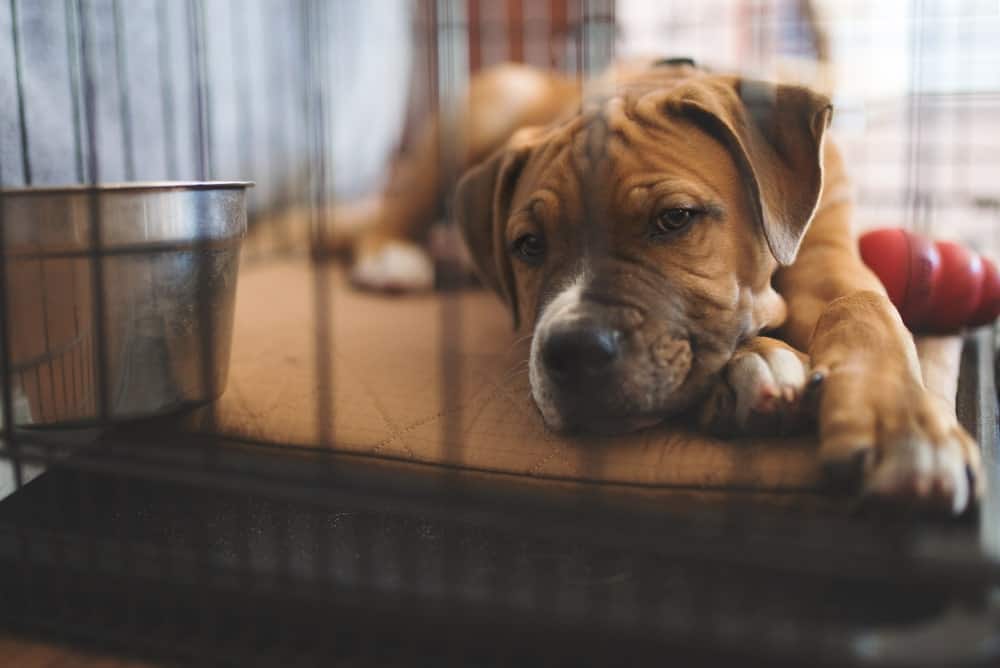“This post contains affiliate links, and I will be compensated if you make a purchase after clicking on my links.”
Does your dog tremble and hide during thunderstorms, destroy your house when you leave him home alone, or adopt a stiff posture and act like he might bite visitors when they come into your home? Your dog may have anxiety and he may need some help managing this issue.

Dogs have anxiety just like humans. And, just like how stress and anxiety can be useful at times for humans, a little bit of worry can help to keep your dog safe from potentially dangerous situations. Despite this, anxiety in both dogs and humans can get to a point where it’s excessive and affecting daily life, and in those instances, it’s time to help your dog to get his anxiety under control.
Recognizing Your Dog’s Anxiety
Dogs can develop different types of anxiety, and anxiety presents itself differently from case to case. Separation anxiety is one of the most common types of anxiety in dogs, and it occurs when a dog is separated from their owner or left home alone. Other common causes of anxiety include phobias, such as fireworks, fears that are based on previous bad experiences, and even illnesses or injuries that are causing the dog to be in pain.
Anxiety in dogs may present with many different types of symptoms, and anxiety can be mild to severe. If your dog is anxious, you may see some common symptoms like him seeking out your attention, licking or chewing, panting, or trying to hide. A highly anxious dog may exhibit more dramatic symptoms like trying to escape the home or the situation, barking or howling excessively, destroying items like his bed or his crate, acting aggressive toward other pets or humans, and displaying a high level of energy.
Whether your dog has periodic anxiety brought on by certain events or if he experiences more frequent, generalized anxiety, there are a number of ways you can help him to cope with the condition.

Natural Remedies
Some dogs may find anxiety relief from natural remedies. Aromatherapy can help to relieve stress in dogs, and music can also help to soothe anxious dogs. Classical music in particular has been shown to reduce anxiety in dogs, so if you know that you will be leaving your dog alone or if a thunderstorm is approaching, you may want to turn some music on for him ahead of time.
CBD, also known as CO2 Hemp Extract, may also help to relieve your dog’s anxiety. CBD is extracted from hemp and offers many benefits, including reduced pain and inflammation, as well as the relief of anxiety. While there’s only minimal veterinary research into how CBD affects dogs at this time, many veterinarians are still recommending the use of CBD products. CBD oil drops are easy to administer to pets, and you can put the drops on your dog’s food or in his treats.
When giving CBD oil to your dog, start with a very low dosage of 0.25 mg once a day, then gradually increase the dosage. Be sure to check with your vet first before giving your dog CBD or any other natural remedy.
Safety Precautions
Highly anxious dogs can pose a danger to themselves or others, so you may need to take additional steps to keep your dog safe. If your dog suffers from separation anxiety, you may need to invest in a durable, quality crate to keep him in when you have to leave him home alone. This crate isn’t a punishment, but can help to keep him from injuring himself in panic or from chewing and ingesting materials in your home that could harm his health.

Dogs who are anxious about fireworks also require strategic management. You may find that a ThunderShirt or other anxiety wrap helps your dog to relax, and giving your dog a safe, quiet space may also help. It’s important to realize that when your dog is anxious, he’s more likely to flee, even if he wouldn’t run away from you normally. Investing in a GPS tracker for your dog can allow you to track his location with your phone, just in case he does get away in a moment of stress. The GPS may be particularly useful in instances like these, as a panicked dog won’t be using reason and may run to just about anywhere.
Similarly, dogs who are highly anxious may bite people out of fear. Your dog may be more likely to bite strangers who come to your home, like a postal office worker. Not only is it important to find ways to relieve your dog’s anxiety, but you’ll need to keep your dog and others safe, too. Keep your dog in an area where he can’t access visitors to the home and be extra vigilant when he’s anxious and spending time around your family members.
Professional Help
Depending on the severity of your dog’s anxiety and how effective your treatments have been, you may need to consult a professional for help. Your dog’s veterinarian may prescribe one of many different medications available to help treat anxiety in dogs. Some dogs may be able to eventually be weaned off of these medications, while others may need to stay on these medications for their entire lives.
There are many ways to help manage your dog’s anxiety, but it may take some time and experimentation to find the methods that are right for your dog. In many cases, a dog’s anxiety can be relieved or reduced so that it’s easier for both the dog and the whole family to cope.
Jori Hamilton is a writer from the pacific northwest. You can follow her on twitter @Jori Hamilton and see more of her work at writerjorihamilton.contently.com.


















